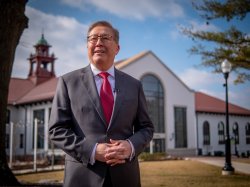Five Questions With . . . Junius Gonzales
A conversation with Montclair’s new Provost and Senior Vice President for Academic Affairs
Posted in: Faculty Voices, Homepage News, University

Soon after our new provost, Junius Gonzales, MD, MBA, started his job as the second highest ranking officer at the University earlier this month, we sat down with him to get to know him better. Here are excerpts from that conversation:
You are a first-generation college graduate. What was your journey like?
My parents immigrated to the U.S. from Peru separately and met in Hartford. They were not educated. I grew up in Hartford, in a working-class area, and the kids in my neighborhood didn’t really have career aspirations. Over half of high school grads didn’t go on to higher education, and many, like me, were really poor.
I had four high school friends, and we made an agreement with each other that we were going to make something of ourselves. We were fortunate that we had some teachers and mentors who helped us. One couple from our church even drove us all around New England to visit campuses.
We decided to apply to different schools, to increase our chances, and we were all admitted to prestigious institutions like Dartmouth, Brown and Williams. We were probably the first applicants they’d seen from our poor, urban high school. I am glad for that because it showed the other kids who came after us that they could do it, too.
It was remarkable, really, because none of us had any parents who went to college. It’s made me realize how equality of opportunity and access can make a huge difference for people and communities, and it’s why a lot of my research is in health disparities. It’s also why I got drawn into public higher education, and why I’m so drawn to Montclair.
In my career, I’ve made big leaps into the unknown: moving from traditional academic medicine at Georgetown into NIH and working on research with people from across the country, technically as a junior person. I was young, but the head of the Institute had been my teacher and mentor and thought I could do it. Then I made a leap to consulting, then a leap to become a dean and create a new college, and so on. I try to transmit to students that you can take big leaps and you’ll be okay. Sometimes they need a nudge. I tell them you can always return.
What do you consider to be your greatest accomplishment?
Finishing medical school and completing my internship in internal medicine and my residency in psychiatry at top notch hospitals. I entered medical school prepared, but my classmates were really exceptionally well prepared. It was intense, and I was ready to quit after my first semester. A good friend of mine (shout out to Ellen!) said that if I finished that first semester, she would take me to see a Broadway show. The show was the original Dreamgirls – and if you know the story, it’s about overcoming adversity. Nearly at the same time, a new friend gave me Becker’s The Denial of Death to read – that was important for me, in part because I was interested in psychiatry, and it opened my eyes to new thinking. Those – and others’ belief in me – helped to inspire me. I took a little time off, as did one third of my medical school class, and spent a year as an inaugural Dana Foundation Scholar, where I got to meet peers from other schools across the country, then I went back and completed my education.
How has your training as a physician influenced your work as a university administrator?
In two ways, I think. As a physician, you are working with a dedicated team of professionals, and there’s intense collaboration, with distributed authority and collective responsibility. That’s shaped my approach to higher education leadership. Second, when you are caring for people who are ill and their families, you learn so much about pain and life and compassion. It’s helped me develop a deeper and different empathy for, and a sense of connection to, everyone I come in contact with.
What are you reading right now?
I enjoy reading about higher education. It’s a fascinating culture. I just finished reading The Great Upheaval by Levine and Van Pelt. They chronicle other industries and what happened, like newspapers and how they adjusted to changing conditions, and they make the argument for where higher education needs to go. I also enjoy fiction. I’m currently reading Penance by Kanae Minato, a novel that’s got a lot of twists and turns. It’s a gripping story.
What do you enjoy doing outside of work?
Walking in nature with my dog Beulah, a mix of one quarter springer spaniel and three quarters Boykin, the state dog of South Carolina. She’s fierce in the field as a “bird dog,” curious and protective outside the house, and gentle and loving inside. I’m also looking forward to exploring New Jersey’s mountains and forests, and enjoying the Shore.
I like spending time with friends, eating and experiencing live theater. I am also a huge music fan, especially jazz vocalists. Two of my favorites are Jackie Ryan and Tessa Souter. Tessa’s album Picture in Black and White is one that I listen to over and over. She identified as white then found out in her late 20s that her father is Black, and she takes you through her personal journey. It’s not easily accessible, but it is terrific, just beautifully done.
This interview was conducted by Joseph Brennan, vice president for Communications and Marketing. It’s been edited for length and clarity. Photo by University Photographer Mike Peters.
